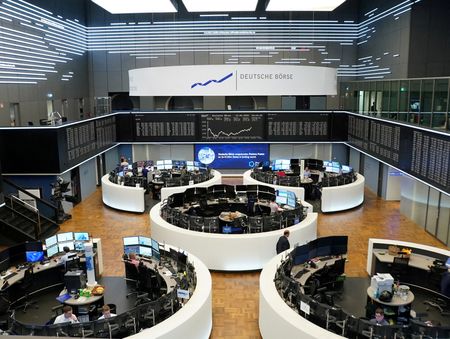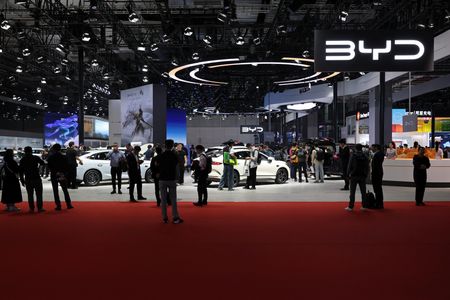By Christoph Steitz, Julia Payne and David Lawder
FRANKFURT/BRUSSELS/WASHINGTON (Reuters) -Brussels is discussing with U.S. counterparts a range of measures aimed at protecting the European Union’s auto industry from steep U.S. import duties, including tariff cuts, import quotas and credits against the value of EU automakers’ U.S. exports, industry sources and trade officials say.
The talks are part of efforts by the European Commission, the bloc’s executive branch, to reach a trade agreement outline with the United States in the coming days, ahead of the August 1 deadline set by U.S. President Donald Trump for broad tariff increases.
Trump said on Tuesday he would “probably” tell the EU within two days what rate it could expect for its exports to the U.S., adding that the 27-nation bloc had become much more cooperative.
EU negotiators have sought relief from tariffs in key sectors such as autos and aerospace. One EU diplomat previously said cars were a “red line” for the bloc, making a U.S. concession on cars a caveat of any deal.
Since April, EU carmakers have incurred a 25% U.S. import tariff on top of the 2.5% already in place. The levy is separate from Trump’s prior threatened 20% “reciprocal” tariff announced in April but dialed back to 10%.
Discussions are ongoing and it is unclear if the U.S. administration will agree to all terms from its biggest bilateral trading partner, the sources said.
The White House, the U.S. Trade Representative’s Office and the Commerce Department did not immediately respond to requests for comment on the U.S.-EU negotiations. The European Commission also had no immediate comment for this story.
EU trade chief Maros Sefcovic said on Wednesday the Commission has made good progress on a framework trade agreement with the United States and a deal may be possible in the coming days.
The sources – two European industry sources, three European officials and three U.S. industry sources familiar with the talks – declined to be identified because the talks are confidential.
EXPORT CREDITS
A U.S. source and one European official said things are moving “fast” in the negotiations.
On the table is a proposal that would provide some relief from import tariffs for carmakers that produce vehicles in the United States and export them to other countries, three of the sources said.
Under that plan, carmakers that export vehicles from the U.S. would get credits for that export value, which could then be applied against the value of any imports from the EU into the U.S., the U.S. source said.
That would allow companies to import that value of vehicle duty-free or at a reduced rate, while anything above it would be subject to the maximum tariff.
Such a mechanism would benefit carmakers BMW and Mercedes-Benz, which both have major production hubs in the United States for sport-utility vehicles, with a significant share of their output exported.
Two sources said the U.S. had offered some relief if a company agrees to make additional investment, a mechanism that would help Volkswagen, which barely exports out of U.S. plants but is weighing a local factory for its Audi brand.
The terms are a delicate balancing act for Brussels as it tries to find concessions that are acceptable to carmakers such as BMW, Porsche, Volkswagen and Mercedes-Benz, as well as to the Trump administration, which wants to boost U.S. manufacturing and create jobs.
TARIFF RATES, QUOTAS DISCUSSED
Europe shipped nearly 758,000 cars worth 38.9 billion euros ($45.57 billion) to the U.S. in 2024, more than four times as many as in the other direction, according to data from European auto association ACEA.
Two of the sources said the framework may be similar to the one agreed with Britain in May. In that deal, the U.S. cut tariffs on British-made cars to 10% and British carmakers received a import quota of 100,000 cars a year at the lower tariff rate, almost the total Britain exported last year.
While the EU had proposed a similar tariff-rate quota with a certain number of vehicles imported, two U.S. industry sources said the Trump administration was leaning against this.
Three sources said both sides have discussed cutting their respective auto import tariffs from current levels – 27.5% for imports into the U.S., and 10% for imports into the EU.
Non-tariff elements such as standardising regulation, for example in the area of auto safety tests, are also being offered by the EU, one of the people said.
($1 = 0.8536 euros)
(Reporting by Christoph Steitz in Frankfurt, Julia Payne in Brussels and David Lawder in DC; Additional reporting by Christina Amann in Berlin;Writing by Josephine Mason in LondonEditing by Rod Nickel)











